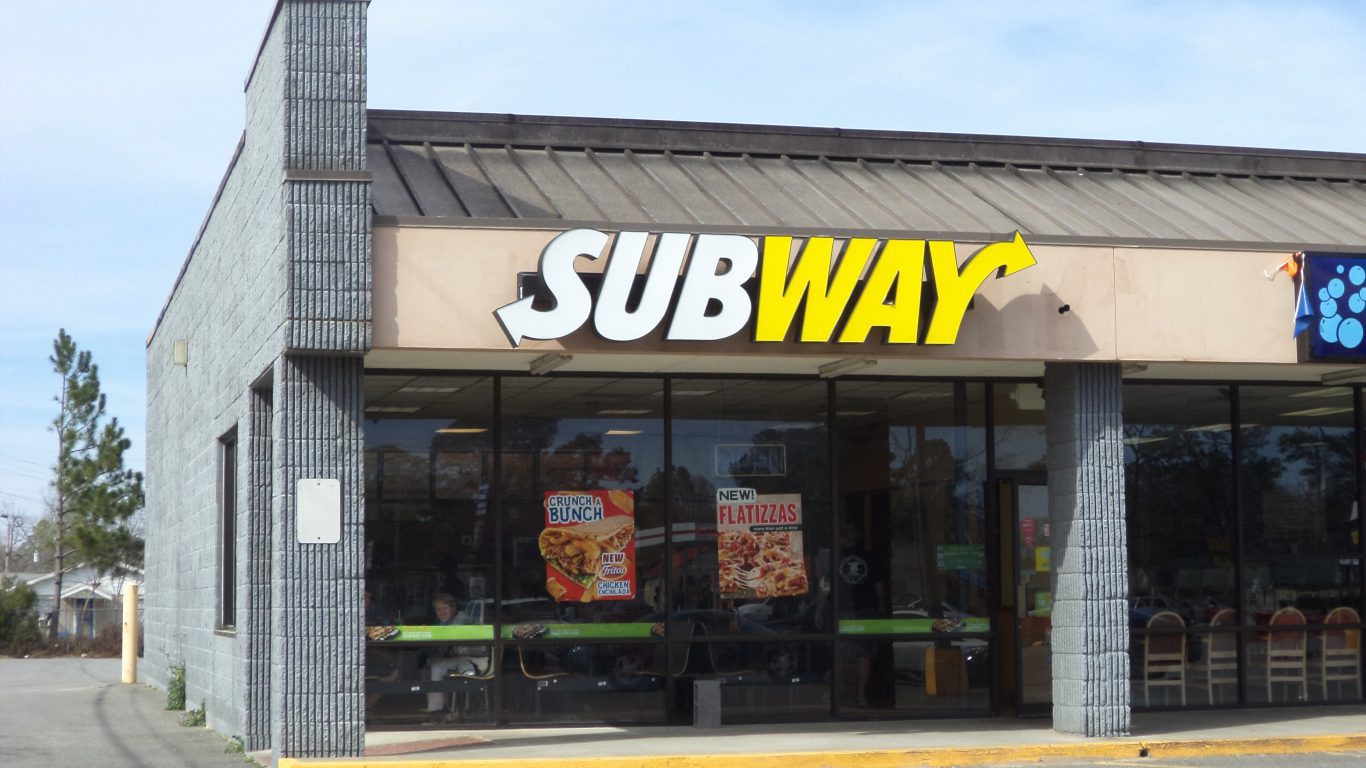
Based on the number of store locations at the end of 2018, the largest fast-food company in the United States is privately held Subway with 24,798 stores. And that’s after shaving off 1,110 during the year.
In the past three years, Subway has closed 2,335 stores as it tries to curb its falling sales. The efforts have not stopped there. The store has made design and physical changes to its stores, 100% of which are owned by franchisees who are required to pay an initial fee of $15,000 and start-up costs range from a low of $89,550 to $328,700.
Subway also has made changes to its menu, the most recent of which was announced Wednesday morning. Beginning in September, and for a limited time only, Subway will offer a Beyond Meatball Marinara Sandwich at 685 stores in the United States and Canada. The Beyond Meatball sandwich will be made with plant-based protein “options” from Beyond Meat Inc. (NASDAQ: BYND). The company said the new sandwich kicks off a new partnership with Beyond Meat “to explore new plant-based protein offerings.”
Can meatless protein drive Subway’s rejuvenation plans? Subway has a long way to go to move up the ladder of top-ranked fast-food restaurants.
Earlier this week QSR Magazine posted its list of the top 50 fast-food chains based on 2018 sales in the United States. Subway ranks third with systemwide sales of $10.41 billion, compared to sales of $19.7 billion at number two-ranked Starbucks Corp. (NASDAQ: SBUX) and $38.52 billion at top-ranked McDonald’s Corp. (NYSE: MCD).
What’s worse for Subway is average sales per store of just $420,000, barely up from $417,000 in 2017, according to QSR Magazine. Average sales per store at Starbucks was $1.35 million in 2018, up from $945,000 in 2018. McDonald’s averaged 2018 sales of $2.77 million at 13,914 U.S. stores, a jump of $100,000 per store over 2017 totals.
Ranked fourth in both 2017 and 2018 was Yum! Brands Inc.’s (NYSE: YUM) Taco Bell chain, where total revenues rose by about $300 million to $10.3 billion in 2018 and per-store revenue rose by $100,000 to $1.6 million.
The fifth-ranked 2018 chain was Chick-fil-A, with total U.S. sales estimated at $10 billion and average sales at the company’s 2,400 stores came to $4.17 million, the highest of any chain in the top 50. Chick-fil-A’s estimated 2017 sales came to $9 billion and per-store revenues came in at $4.08 million at 2,225 stores. In 2017, the company ranked eighth in total U.S. sales.
Rounding out 2018’s top 10 were The Wendy’s Co. (NASDAQ: WEN) with total U.S. sales of $9.99 billion and a per-store average of $1.64 million; Restaurant Brands International’s (NYSE: QSR) Burger King posted 2018 revenues of $9.95 billion and boasted a per-store average of $1.36 million; Dunkin’ Brands Group Inc. (NASDAQ: DNKN) Dunkin’ stores rang up revenues of $8.79 billion with an average per store of $933,000; Domino’s Pizza Inc. (NYSE: DPZ) had U.S. sales last year of $6.6 billion and a per-store average of $1.12 million; 10th-ranked Panera Bread, which is owned by Germany’s JAB Holding, posted $5.73 billion in U.S. sales and an average per store of $2.74 million.
Among the top 10, only Subway and McDonald’s posted a lower store count in 2018 than in 2017, but McDonald’s closed just 122 stores compared to the 1,100 closed by Subway. Subway was one of only three chains in the top 10 that is entirely franchised. Chick-fil-A and Dunkin’ are the others.
Subway depended for a long time on its positioning as a healthy alternative to other fast-food options. Competition from other chains for healthy fast-food choices shook the company and it’s trying to regain its marketing mojo as the leader in healthful fast-food options. The deal with Beyond Meat is another step on the road to improving Subway’s sales and profitability.
It’s Your Money, Your Future—Own It (sponsor)
Retirement can be daunting, but it doesn’t need to be.
Imagine having an expert in your corner to help you with your financial goals. Someone to help you determine if you’re ahead, behind, or right on track. With SmartAsset, that’s not just a dream—it’s reality. This free tool connects you with pre-screened financial advisors who work in your best interests. It’s quick, it’s easy, so take the leap today and start planning smarter!
Don’t waste another minute; get started right here and help your retirement dreams become a retirement reality.
Thank you for reading! Have some feedback for us?
Contact the 24/7 Wall St. editorial team.


